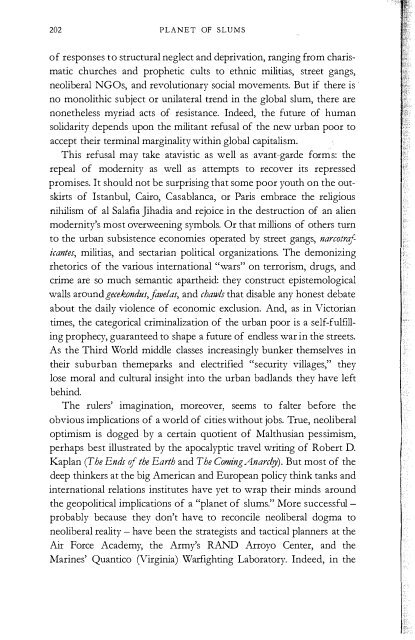Untitled - Rebel Studies Library
Untitled - Rebel Studies Library
Untitled - Rebel Studies Library
Create successful ePaper yourself
Turn your PDF publications into a flip-book with our unique Google optimized e-Paper software.
202 PLANET OF SLUMS<br />
of responses to structural neglect and deprivation, ranging from charismatic<br />
churches and prophetic cults to ethnic militias, street gangs,<br />
neoliberal NGOs, and revolutionary social movements. But if there is .<br />
no monolithic subject or unilateral trend in the global slum, there are<br />
nonetheless myriad acts of resistance. Indeed, the future of human<br />
solidarity depends upon the militant refusal of the new urban poor to<br />
accept their terminal marginality within global capitalism.<br />
This refusal may take atavistic as well as avant-garde forms: the<br />
repeal of modernity as well as attempts to recover its repressed<br />
promises. It should not be surprising that some poor youth on the outskirts<br />
of Istanbul, Cairo, Casablanca, or Paris embrace the religious<br />
nihilism of al Salafia Jihadia and rejoice in the destruction of an alien<br />
modernity's most overweening symbols. Or that millions of others turn<br />
to the urban subsistence economies operated by street gangs, narcotraf<br />
icantes, militias, and sectarian political organizations. The demonizing<br />
rhetorics of the various international "wars" on terrorism, drugs, and<br />
crime are so much semantic apartheid: they construct epistemological<br />
walls aroundgecekondus,javelas, and chawls that disable any honest debate<br />
about the daily violence of economic exclusion. And, as in Victorian<br />
times, the categorical criminalization of the urban poor is a self-fulfilling<br />
prophecy, guaranteed to shape a future of endless war in the streets.<br />
As the Third World middle classes increasingly bunker themselves in<br />
their suburban themeparks and electrified "security villages," they<br />
lose moral and cultural insight into the urban badlands they have left<br />
behind.<br />
The rulers' imagination, moreover, seems to falter before the<br />
obvious implications of a world of cities without jobs. True, neoliberal<br />
optimism is dogged by a certain quotient of Malthusian pessimism,<br />
perhaps best illustrated by the apocalyptic travel writing of Robert D.<br />
Kaplan (The Ends of the Earth and The ComingAnarcby). But most of the<br />
deep thinkers at the big American and European policy think tanks and<br />
international relations institutes have yet to wrap their minds around<br />
the geopolitical implications of a "planet of slums." More successful -<br />
probably because they don't have to reconcile neoliberal dogma to<br />
neoliberal reality - have been the strategists and tactical planners at the<br />
Air Force Academy, the Army's RAND Arroyo Center, and the<br />
Marines' Quantico (Virginia) Warfighting Laboratory. Indeed, in the<br />
EPILOGUE 203<br />
absence of other paradigms, the Pentagon has evolved its own distinctive<br />
perspective on global urban poverty.<br />
The Mogadishu debacle of 1993, when slum militias inflicted 60<br />
percent casualties on elite Army Rangers, forced military theoreticians<br />
to rethink what is known in Pentagonese as MOUT: "Military<br />
Operations on Urbanized Terrain." Ultimately a National Defense<br />
Panel review in December 1997 castigated the Army as unprepared for<br />
protracted combat in the nearly impassable, mazelike streets of poor<br />
Third World cities. All the armed services, coordinated by the Joint<br />
Urban Operations Training Working Group, launched crash programs<br />
to master street-fighting under realistic slum conditions. "The future of<br />
warfare," the journal of the Army War College declared, "lies in the<br />
streets, sewers, highrise buildings, and sprawl of houses that form the<br />
broken cities of the world .... Our recent military history is punctuated<br />
with city names - Tuzla, Mogadishu, Los Angeles [I], Beirut, Panama<br />
City, Hue, Saigon, Santo Domingo - but these encounters have been<br />
but a prologue, with the real drama still to come."8<br />
To help develop a larger conceptual framework for MOUT, military<br />
planners turned in the 1990s to Dr. Strangelove's old alma mater, the<br />
Santa Monica-based RAND Corporation. RAND, a nonprofit think<br />
tank established by the Air Force in 1948, was notorious for wargaming<br />
nuclear Armageddon in the 1950s and for helping to strategize<br />
the Vietnam War in the 1960s. These days RAND does cities: its<br />
researchers ponder urban crime statistics, inner-city public health, and<br />
the privatization of public education. They also run the Army's Arroyo<br />
Center, which has published a small library of studies on the social<br />
contexts and tactical mechanics of urban warfare.<br />
One of the most important RAND projects, initiated in the early<br />
1990s, has been a major study of "how demographic changes will affect<br />
future conflict." The bottom line, RAND finds, is that the urbanization<br />
of world poverty has produced "the urbanization of insurgency" - the<br />
title of their report. "Insurgents are following their followers into the<br />
cities," RAND warns, "setting up 'liberated zones' in urban shantytowns.<br />
Neither U.S. doctrine, nor training, nor equipment is designed<br />
8 Major Ralph Peters, "Our Soldiers, Their Cities," Parameters (Spring 1996),<br />
pp. 43-50.


